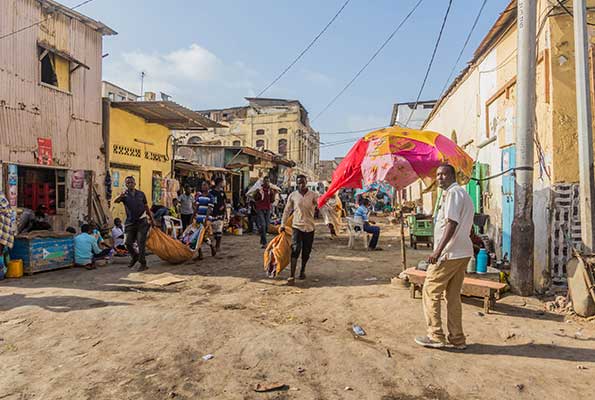The tiny African republic of Djibouti, which is situated on the Bab el-Mandeb Strait, acts as a gateway to the Suez Canal, one of the busiest shipping lanes in the world.
The largest source of income and employment in an otherwise desolate nation, the port is vital to its economy.
Djibouti is a desired location for foreign military outposts and has secured a continual flow of international aid due to its closeness to Africa and the Middle East and its relative stability.
Former colonial power France continues to have a sizable military presence. Additionally, the nation is home to Japan’s first military outpost since the Second World War, China’s first overseas military installation, and America’s largest military base in Africa.
It is the main trade entry point for its enormous neighbour and neighbouring landlocked Ethiopia.
The Economic Outlook
The International Monetary Fund (IMF) forecasts that Djibouti’s economy will continue to grow in 2023, although it notes that the outlook depends on regional and global developments.
Joyce Wong, who led a UN delegation to the nation, claims that while handling the COVID-19 outbreak, Djibouti is still dealing with the effects of the Ukraine war, the strife in Ethiopia, the tightening of financial conditions globally, and climate change.
Recent Developments
Real GDP growth decreased from 4.8% in 2021 to 3.7% in 2022 as a result of decreased port traffic brought on by the Tigray War and decreased governmental investment.
The COVID-19 pandemic’s socioeconomic effects subsided in 2022; however, inflation increased to 5.3% from 1.2%, primarily because of increasing food prices.
The goal of an expansionist monetary policy is to promote economic growth and lessen the effects of multiple exogenous shocks. In 2022, the budget deficit decreased from 1.3% of GDP in 2021 to 1.0% of GDP as a result of lower aid and more tax collection.
Bank loans, accrued external arrears, and external borrowing provided the majority of the funding for the deficit.
Because exports decreased faster than imports did and transfers decreased without equivalents, the current account surplus shrank from 28.0% of GDP in 2021 to 25.1% in 2022.
External over-indebtedness is quite risky. From 74.1% of GDP in 2021 to 71.6% in 2022, public debt decreased.
In 2022, it was predicted that foreign exchange reserves would fund imports for three months.
Despite the banking industry’s continued stability and liquidity, performance in 2022 was uneven due to deposit withdrawals and a return to bank financing.
Due to the stringent consolidation strategy on open receivables, the nonperforming loans ratio decreased from 16.2% at the end of 2019 to 5.5% in September 2022. Due to government efforts to lessen multiple shocks, the poverty rate decreased from 16.9% in 2021 to 16.5% in 2022.
Prospects & Dangers
The medium-term economic picture for Djibouti is promising since peace has returned to Ethiopia. The predicted GDP growth for 2023 and 2024 is 5.4% and 6.5%, respectively.
Given that the cost of necessities would continue to be high through 2023–24, inflation is expected to decline to 3% on average. Between 2023 and 2024, the budget deficit is expected to increase to 2.1% of GDP as a result of increased investment and ongoing spending.
It is anticipated that the current account surplus will continue to shrink in 2023–2024, primarily as a result of decreased exports and stagnant income from foreign military posts.
The expected increase in public debt to 73% of GDP between 2023 and 2024 is a result of foreign loans utilized to fund infrastructure projects. Over 2023–2024, it is anticipated that foreign exchange reserves will hold steady at about three months of import coverage.
Instability in Ethiopia returning, problems paying off foreign debt, a protracted Russian assault on Ukraine, the ongoing effects of climate change, and a comeback of COVID-19 are all potential hindrances.
Concerns Related To Climate Change
Climate change puts the country of Djibouti at risk by threatening water supplies and food security. The government has pledged to reduce emissions by 40% by 2030, despite the nation’s insignificant contribution to global greenhouse gas emissions.
This voluntary commitment necessitates significant mitigation and adaptation expenditures. A total of USD 5.5 billion in climate money was required in 2015, some of which has already been raised. 2.2% more GDP is needed for climate finance, while 8.4% more is needed for the green economy.
The green economy has prospects in the areas of energy, water, transportation, industry, and waste management as top priorities. Private funding for combating climate change and a green economy is still in its infancy.
Despite the scarcity of natural resources, there is great potential for the growth of tourism, fishing, and salt production. Additional private financial resources might be mobilized by enhancing the planning capabilities and the legal, regulatory, and incentive framework.
To meet the nation’s financial demands for combating climate change and a green economy, the assistance of the international community continues to be crucial.



